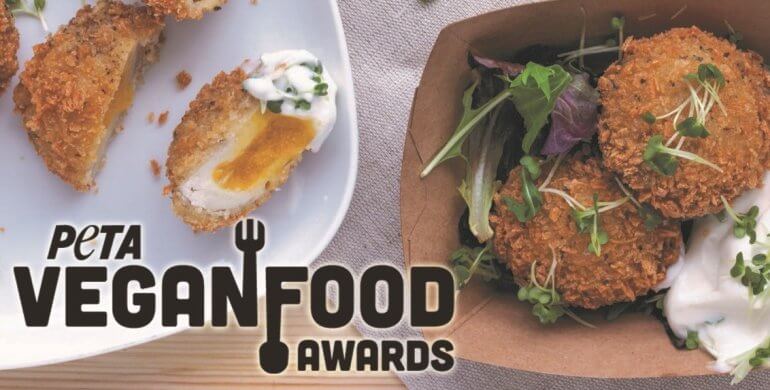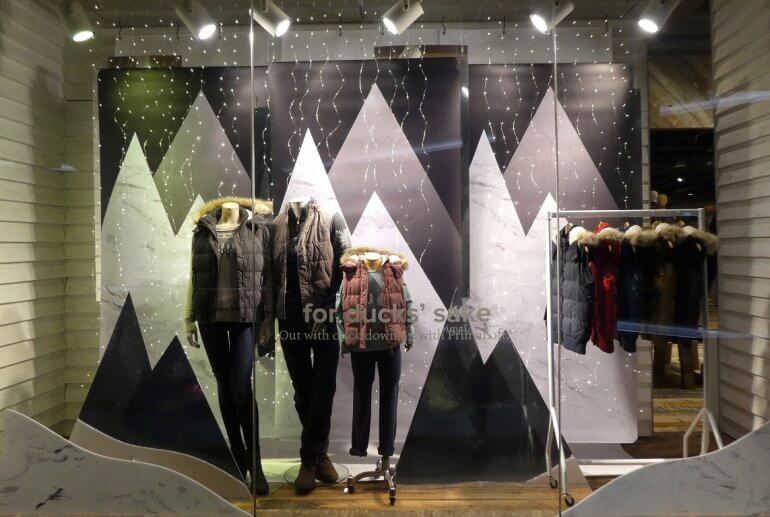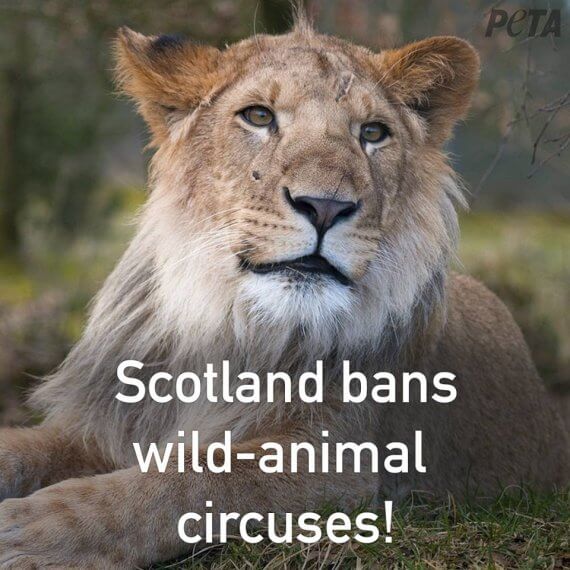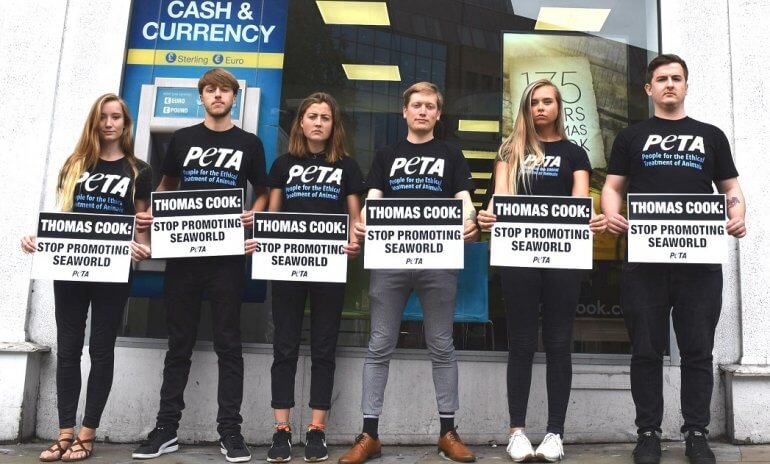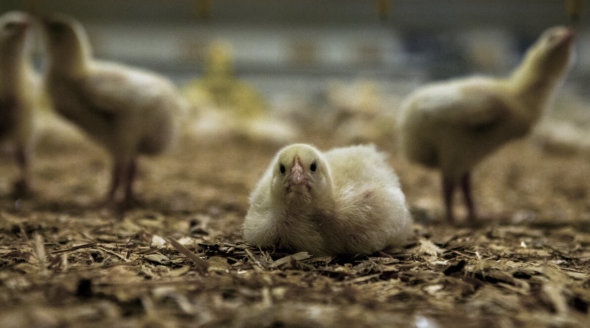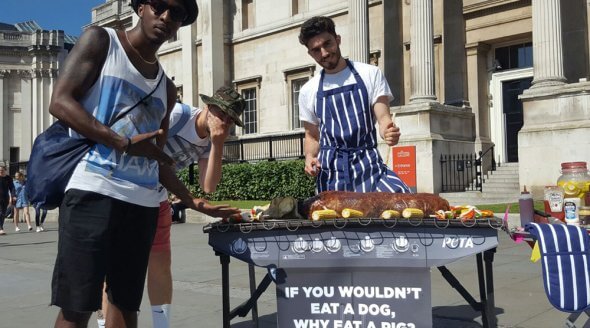What PETA UK Achieved for Animals in 2017
2017 was another landmark year for PETA UK. We persuaded major fashion retailers to stop selling down, angora wool, and fur. Demand from companies wanting to display our “PETA-Approved Vegan” logo skyrocketed. We exposed the meat industry’s fraudulence in using labels such as “free-range”. Requests for our free vegan starter kit flooded in by the tens of thousands. Our scientists helped reduce the use of animals in chemical testing by working to change international testing guidelines. From helping to bring about the introduction of legislation that would ban the use of wild animals in Scottish and Irish circuses to thwarting plans for a rabbit factory farm in Stafford, we’ve had a year full of significant victories for animals.
This year, we took advantage of the power of social media to inspire people to get active for animals. In 2017, our Facebook posts were viewed an average of 12 million times each month, our videos were viewed more than 25 million times, and over 1 million subscribers received our regular e-mail action alerts that made it easy for them to speak out for animals. Our online advocacy campaigns resulted in more than 700,000 letters urging companies and individuals to make changes to benefit animals. Well-known celebrities – including rugby legend Mirco Bergamasco, dancer Sylvie Guillem, musician Tommy Lee, television presenter Sharon Osbourne, talent judge Louis Walsh, reality-TV star Lucy Watson, and actors Pamela Anderson, Sadie Frost, Tom Hardy, the late Sir Roger Moore, and Andy Serkis – worked with PETA to put animal issues in the headlines and urged people to go vegan, choose cruelty-free fashion, and shun the use of animals for entertainment. And coverage of our campaigns by almost every major media outlet – including the Daily Mail, the Financial Times, The Guardian, The Telegraph, The Times, Forbes, GQ, Vogue, the BBC, CNN, ITV News, and Sky News – ensured that our message reached as many people as possible. Here are just a few highlights of our work:
Animals Are Not Ours to Eat
From biscuit brands to chain restaurants, PETA UK’s corporate team met with companies to encourage them to launch vegan products. And the work has paid off: in 2017, a huge number of major supermarkets, food companies, and restaurants embraced meat- and dairy-free eating by releasing new vegan products and menu items and even whole ranges free of animal-derived ingredients.
We also launched the UK’s first-ever vegan tube station takeover by plastering every poster, door, and turnstile in London’s Clapham Common station with a total of 60 ads featuring a cow, pig, or chicken declaring, “I’m ME, Not MEAT.” We released eyewitness video exposés of three chicken farms, on which live birds were forced to live amid rotting corpses. Two of the farms exclusively supplied Marks & Spencer, which claims to be a “high welfare” company, proving that such labels are meaningless and that going vegan is the only guaranteed way to avoid harming farmed animals. And with over a quarter-billion total views for our 2017 videos, PETA UK’s wide social media reach prompted a record-breaking number of orders for our free vegan starter kit.
We also helped animals who suffer on farms by filing objections to 10 factory-farm proposals across the UK. Our supporters took action nearly 100,000 times, including by signing our petitions and e-mailing local councils. Councils and planning bodies often agreed with our points, and we saw lots of positive reactions, including from Huntingdonshire District Council, which rejected a proposal for a cruel chicken farm and abattoir near Peterborough, and the Planning Inspectorate government agency, which upheld a decision against a horrific rabbit meat and fur farm in Staffordshire. Decisions are still pending on several of the proposals we objected to, and we expect to have more good news in the new year.
Animals Are Not Ours to Wear
PETA UK’s work for animals suffering in the fashion industry continued in 2017. As a result of our efforts, Selfridges and Notonthehighstreet.com, an online marketplace that hosts a large number of artisans, banned angora wool this year – bringing the number of angora-free retailers on our list to 130. Also, after hearing from PETA, Helen McAlinden dropped fur, Ashley Williams and YOOX NET-A-PORTER agreed to ban both fur and angora, and Alexa Chung, Roland Mouret, and Alice Temperley banned fur, angora, and exotic skins. These victories will spare thousands of rabbits the excruciating pain they endure when their fur is ripped out and will prevent countless reptiles, foxes, minks, and other animals from being cruelly killed, including by being skinned alive.
We persuaded numerous companies – including Desigual, Lazy Oaf, Monsoon Accessorize, Nasty Gal, Oliver Bonas, Puffa, and Skunkfunk – to join our growing list of retailers that have banned down feathers after we showed them that workers on goose farms step on birds’ delicate wings and necks, tightly bind their feet together, and rip their feathers out as they bleed and scream. FatFace is also on the list of brands that ditched down. After learning from PETA UK that sensitive birds are often live-plucked for their feathers, the company switched to using PrimaLoft – an innovative, sustainable material that’s light, warm, and cruelty-free – in its collections. In a bold stand for animals, the brand announced the move with eye-catching window displays in every single one of its 226 stores around the world and put special “No More Duck Down” swing tags on its winter coats and jackets.
This year, more than 80 fashion companies signed up to use our “PETA-Approved Vegan” logo – bringing the total to over 200 – and seven vegan fabric manufacturers earned the right to use the logo as well. And PETA UK continues to pressure companies and organisations – from Canada Goose to the British Fashion Council – to ditch fur, leather, wool, and down.
Animals Are Not Ours to Experiment On
PETA UK is a member of the PETA International Science Consortium Ltd., a team of scientists on three continents who are changing the face of chemical testing. This year, the Consortium worked with the Organisation for Economic Co-operation and Development to create global regulatory testing guidelines that reduce the use of animals. It has also endeavoured to influence policy as an official stakeholder in the European Chemicals Agency (ECHA), the EU agency responsible for overseeing chemical regulation, and is taking a leadership role in scientific projects to spare thousands of animals extreme suffering in eco-toxicity testing.
Through the Consortium, PETA UK scientists also worked to promote non-animal testing methods by supporting companies in their appeals against requests from ECHA to conduct animal tests. One such appeal was against a test that would have involved force-feeding high concentrations of a cosmetics ingredient to pregnant rats or rabbits before dissecting them and their unborn babies. With support from PETA UK’s scientists, the ECHA Board of Appeal rejected the previous decision by ECHA requiring the company to conduct the test.
PETA UK has called on Trading Standards to ensure that companies aren’t breaking the law by selling in the UK products that are also marketed in China – where tests on animals are required by law – following revelations about Clarins, Clinique, Dior, and others. After an appeal from PETA and a petition signed by more than 15,000 supporters, the government agreed to ask for an investigation.
PETA UK also continued its work with nanomaterials. As the field grows, regulators are calling for more and more tests on animals for nanomaterials, which are used in everyday products like sunscreen and toothpaste. PETA UK and its affiliate PETA US are the only animal-protection organisations that have a specialist working in this field, and we’re on a mission to find humane, modern, non-animal solutions to these regulatory tests.
Animals Are Not Ours to Use for Entertainment
In 2017, Scotland became the first country in the UK to ban wild-animal circuses. Over 13,000 PETA supporters contacted their MSPs asking them to follow through on a public consultation that backed outlawing wild-animal circuses by introducing the ban as soon as possible. And on 20 December 2017, members of the Scottish Parliament unanimously voted to pass the Wild Animals in Travelling Circuses (Scotland) Bill. Ireland also announced a ban on wild-animal circuses, following thousands of e-mails sent by PETA supporters to their TDs, as well as letters of support from celebrities such as Pamela Anderson and Louis Walsh calling for a ban. In 2018, PETA UK hopes the momentum will build as we continue to pressure the government in Westminster for a long-awaited ban in England.
The campaign against bullfighting continued in 2017. At the end of last year, PETA UK delivered booklets of 5,000 “love notes” from people around the globe explaining what they love about Spain to Spanish officials in order to let them know that bullfights are not what attracts tourists to their country, and in July, we organised a stunning demonstration of nearly 100 naked human bodies covered with “blood” to protest the annual Running of the Bulls and the bullfights that follow it in Pamplona, Spain. The eye-catching protest was covered by newspapers around the world.
This year saw France ban the breeding of captive dolphins and major strides in PETA US’ campaign against SeaWorld’s cruelty. PETA UK continued to speak up for orcas by holding demonstrations at Thomas Cook branches across the UK, asking that the retailer stop selling tickets to the abusement park.
Animals Are Not Ours to Abuse in Any Other Way
PETA UK speaks out for all animals. In 2017, we paid out a £2,000 reward for information that helped secure the arrest and conviction of a man who shot and killed two cats and seriously injured five others. We distributed educational resources to schoolchildren so that they have the information they need in order to make compassionate choices concerning animals. We supported PETA India’s campaign for sick and malnourished horses, donkeys, and mules who are used as living factories to produce antitoxins and antivenoms. And we received confirmation from Warner Bros that no more owls or other live animals will be used in the Harry Potter tours at Warner Bros Studio Tour London.
Around the World
2017 was also a monumental year for animals around the globe. The “Pig Trial” in Canada put the horrors of the meat industry on show. After 36 years of PETA US protests, the high-profile Ringling Bros and Barnum & Bailey Circus shut down. And major designers Jimmy Choo, Gucci, and Michael Kors all announced bans on fur. Read PETA UK Director Elisa Allen’s overview of 2017’s victories for animals in The Independent.
PETA UK’s affiliates in Asia, Australia, France, Germany, India, the Netherlands, and the United States all helped secure major achievements for animals this year. Demonstrations, ad campaigns, and social media engagement drew attention to animal issues, and investigations, corporate work, legal efforts, youth outreach, and other activities helped stop animal suffering. Watch this video to see PETA US’ inspiring accomplishments from the past year:
How You Can Help
PETA UK is able to continue our work for animals thanks to our members, who are vital in supporting our efforts; our Vanguard Society members, who offer compassion and leadership; our Guardian members, who commit to supporting our work through regular gifts; our Augustus Club members, who give animals a future through a gift to PETA in their wills; and our activists, who take a stand against animal abuse by contacting governments, companies, organisations, and individuals via our online petitions.
Please join them and help make our work for animals in 2018 even more successful:

